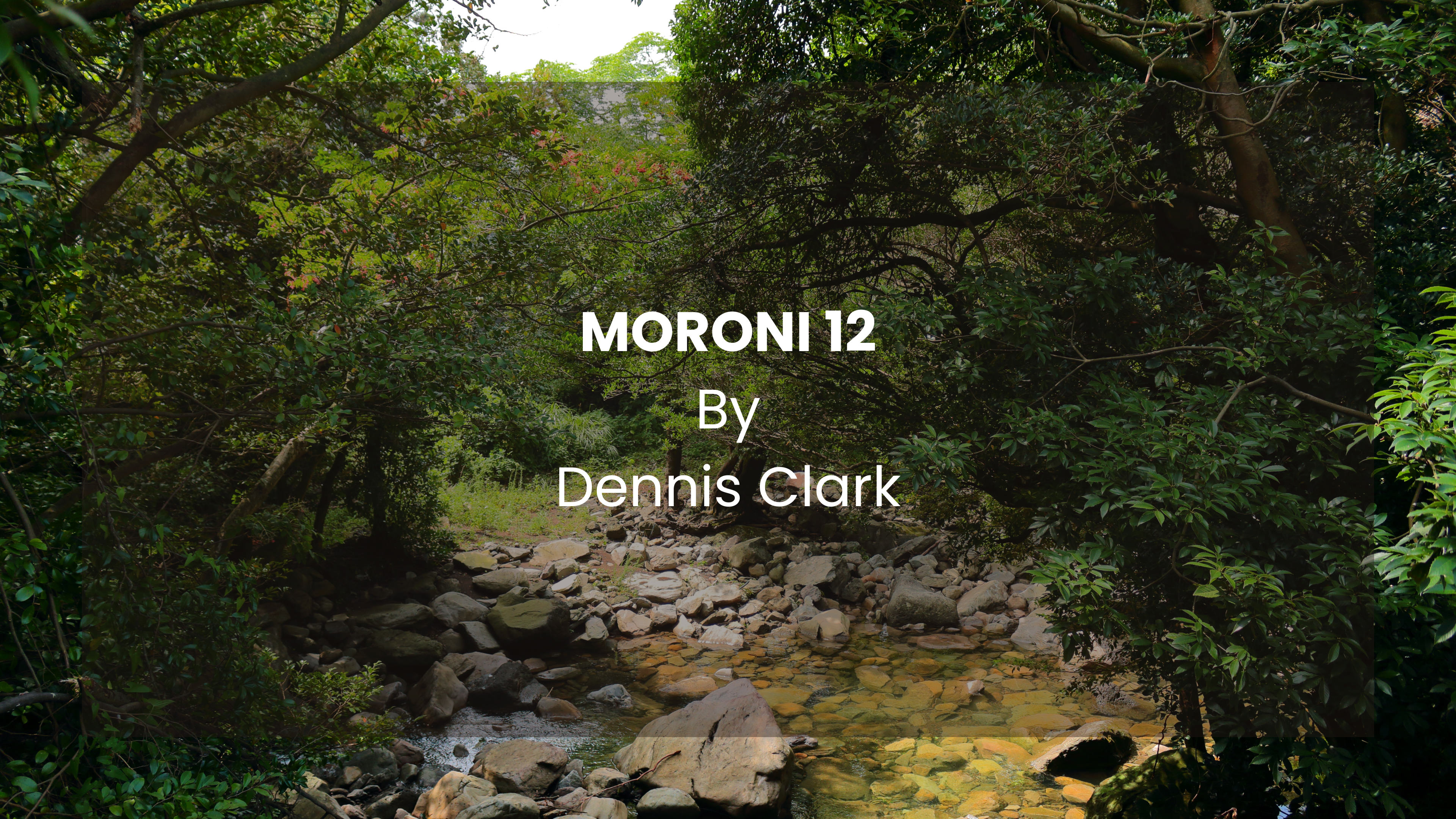Articles/Essays – Volume 56, No. 4
Moroni 12
My father has appeared—not in a dream—
and shown me where to haul the plates off to,
a harder task now that I had the records
of Mormon whole and Ether shortened up
and needed a bigger box to haul them in—
but I was still accustomed to the pack.
He told me I must take the records off
somewhere the sons of Laman do not live,
but led me back to Akimel Hakathi
to visit with my wife and son, a Kumen,
after the one who married us. I found it
hard to return, and harder yet to leave,
for this was the only family I had known.
I left her once again with child and made
my way with Mormon helping me evade
patrols that Laman sent to trap the few
they could not kill, and so my father, from
his pillar of light appeared and guided me
in wandering to that new and far Cumorah,
north through a waste of rock cut like a corpse,
into high watered valleys—to a dead
sea. Then, guided by a line of peaks,
into the rising sun. The mountains shrank
until I came down to a sea of grass
and sentries where the herds of cumoms feed.
All this was new to me, of forest born.
I moved with care, hunted and marked for death—
and though I found the sites where men would yet
raise temples, there were now no cities there,
and others moved like me. I hid from them,
not knowing how far Laman’s sons would seek
to find and kill survivors. I was caught
trying to kill a calf that strayed, with just
my knife, and butcher it. My captors had
no blood of Laman. When they strung me up,
needing to know I was a man like them,
then cut me down, they named me newly theirs.
I wanted to stay, live in a house of skins
and follow the herds across the scroll of seasons,
but I had made a desert river home
and could not tarry where I could become
a bigger target as a stranger here
for anyone who wondered why I’d fled,
what treasure drew me into desolation
and out the other side—richer than fear,
stronger than feud, more wicked than despair.
I could not draw the wolves upon this fold.
I left in greater stealth than I had come
traveling down a river brown with silt
my friends had said would take me to the sea,
with all that soil its flood was bearing off.
This brown earth led me to the red, where God
had fashioned from the dust the first of men
and women. There I left and moved again
across the prairie rolling like a sea
to where my father showed me. There I made
an altar to my God where he would soon,
or late, arrive—not now, but far enough
into the future I could not neglect
the task my father set me, so again
I tracked the river bank to where it joined
a larger, greener river moving slower,
crossed it by night and found a city there
(where on the other shore a river joined),
first one I’d come across. I skirted it
but lingered too long spying on its mounds
and ramparts. None knew what to make of me.
They made me prisoner, and when they saw
the scars across my chest they made me come
before their king, his war-chief, council chiefs,
and tell the story I had kept concealed,
or die. I’d learned the people’s tongue enough
to tell another captive who had come
from that same people in his tongue—but he
knew I was not a warrior of that folk,
and told them I was not his kin. Through him
I told my story, how I’d fled sure death,
a fugitive from Laman and his justice —
the story of two brothers who had fought:
the younger fled, the elder had pursued,
a thousand years, at first just from the shore
to upland, thence into secluded valleys,
and fought more often than they’d loved, for all
those years, till finally like a festering wound,
their civilization split and drenched both tribes
in pus and blood. “No innocent brother’s blood
cried from the ground. I only am escaped
alone to tell you. All my people dead—
slaughtered or made betrayers of their own
and only. Some who know me help the sons
of Laman. I have watched them miss my path.
“This is the reason I cannot remain.
I would not willingly expose you to
such hatred. They who follow will proclaim
that you have welcomed death in hosting me
unless there is no trace that I was here.”
Such was my plea. They sent me off in stealth
and I have moved in stealth across the land,
living by bow and knife, trading sometimes
with peoples in their camps out hunting meat—
but mostly moving in the shadows, slow,
sleeping in trees, hiding in thickets, caves
that masked my scent, & copses in open country,
not daring to believe I would escape,
led by my father like a liahona
to find this hill whence he would move the plates.
I made this journey to secure the plates
of his and Ether’s records, which I’d finished.
So now they’re hid across a sea of grass,
and now I have to let it be, and vanish.
Note: The Dialogue Foundation provides the web format of this article as a courtesy. There may be unintentional differences from the printed version. For citational and bibliographical purposes, please use the printed version or the PDFs provided online and on JSTOR.


 Back to full Issue
Back to full Issue

